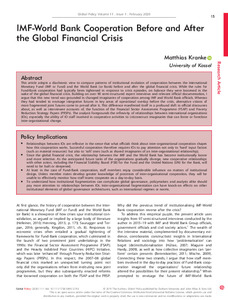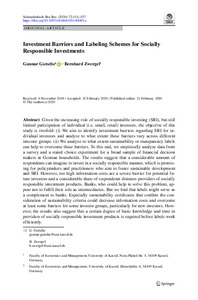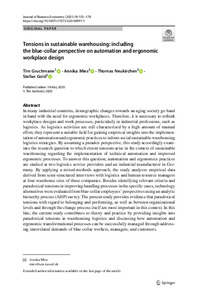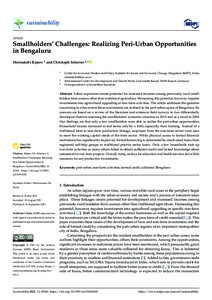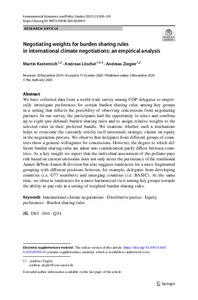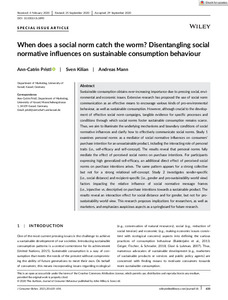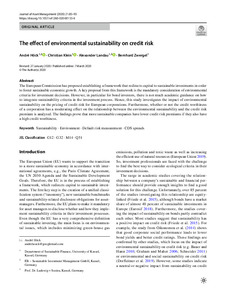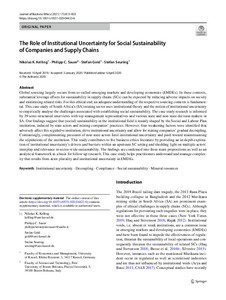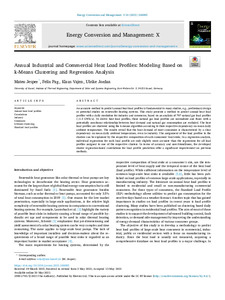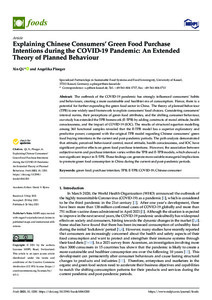Suche
Anzeige der Dokumente 11-20 von 70
Aufsatz

 IMF‐World Bank Cooperation Before and After the Global Financial Crisis
IMF‐World Bank Cooperation Before and After the Global Financial Crisis
(2019-12-29)
This article adopts a diachronic view to compare patterns of institutional evolution of cooperation between the International Monetary Fund (IMF or Fund) and the World Bank (or Bank) before and after the global financial crisis. While the rules for Fund‐Bank cooperation had typically been tightened in response to crisis episodes, on balance they were loosened in the wake of the global financial crisis. Building on over 90 semi‐structured expert interviews and relevant official documentation, I argue that this new ...
Aufsatz

 Investment Barriers and Labeling Schemes for Socially Responsible Investments
Investment Barriers and Labeling Schemes for Socially Responsible Investments
(2020-02-21)
Given the increasing role of socially responsible investing (SRI), but still limited participation of individual (i.e. small, retail) investors, the objective of this study is twofold: (i) We aim to identify investment barriers regarding SRI for individual investors and analyze to what extent these barriers vary across different investor groups. (ii) We analyze to what extent sustainability or transparency labels can help to overcome these barriers. To this end, we empirically analyze data from a survey and a stated ...
Aufsatz

 Tensions in sustainable warehousing: including the blue-collar perspective on automation and ergonomic workplace design
Tensions in sustainable warehousing: including the blue-collar perspective on automation and ergonomic workplace design
(2020-05-14)
In many industrial countries, demographic changes towards an aging society go hand in hand with the need for ergonomic workplaces. Therefore, it is necessary to rethink workplace designs and work processes, particularly in industrial professions, such as logistics. As logistics activities are still characterized by a high amount of manual effort, they represent a suitable field for gaining empirical insights into the implementation of automation and ergonomic practices to inform social sustainable warehousing logistics ...
Aufsatz

 Smallholders’ Challenges: Realizing Peri-Urban Opportunities in Bengaluru
Smallholders’ Challenges: Realizing Peri-Urban Opportunities in Bengaluru
(2021-09-10)
Urban expansion creates potential for increased incomes among previously rural smallholders from sources other than traditional agriculture. Harnessing this potential, however, requires investments into agricultural upgrading or non-farm activities. The article addresses the question concerning to what extent these investments are realised in the peri-urban space of Bengaluru. Its answers are based on a review of the literature and extensive field surveys in two differentially developed districts assessing the ...
Aufsatz

 Negotiating weights for burden sharing rules in international climate negotiations: an empirical analysis
Negotiating weights for burden sharing rules in international climate negotiations: an empirical analysis
(2020-11-03)
We have collected data from a world-wide survey among COP delegates to empirically investigate preferences for certain burden sharing rules among key groups in a setting that reflects the possibility of observing concessions from negotiating partners. In our survey, the participants had the opportunity to select and combine up to eight (pre-defined) burden sharing rules and to assign relative weights to the selected rules in their preferred bundle. We examine whether such a mechanism helps to overcome the currently ...
Aufsatz

 When does a social norm catch the worm? Disentangling social normative influences on sustainable consumption behaviour
When does a social norm catch the worm? Disentangling social normative influences on sustainable consumption behaviour
(2020-11-08)
Sustainable consumption obtains ever-increasing importance due to pressing social, environmental and economic issues. Extensive research has proposed the use of social norm communication as an effective means to encourage various kinds of pro-environmental behaviour, as well as sustainable consumption. However, although crucial to the development of effective social norm campaigns, tangible evidence for specific processes and conditions through which social norms foster sustainable consumption remains scarce. Thus, ...
Aufsatz

 The effect of environmental sustainability on credit risk
The effect of environmental sustainability on credit risk
(2020-03-07)
The European Commission has proposed establishing a framework that redirects capital to sustainable investments in order to foster sustainable economic growth. A key proposal from this framework is the mandatory consideration of environmental criteria for investment decisions. However, in particular for bond investors, there is not much academic guidance on how to integrate sustainability criteria in the investment process. Hence, this study investigates the impact of environmental sustainability on the pricing of ...
Aufsatz

 The Role of Institutional Uncertainty for Social Sustainability of Companies and Supply Chains
The Role of Institutional Uncertainty for Social Sustainability of Companies and Supply Chains
(2020-04-06)
Global sourcing largely occurs from so-called emerging markets and developing economies (EMDEs). In these contexts, substantial leverage effects for sustainability in supply chains (SCs) can be expected by reducing adverse impacts on society and minimising related risks. For this ethical end, an adequate understanding of the respective sourcing contexts is fundamental. This case study of South Africa’s (SA) mining sector uses institutional theory and the notion of institutional uncertainty to empirically analyse the ...
Aufsatz

 Annual industrial and commercial heat load profiles: modeling based on k-Means clustering and regression analysis
Annual industrial and commercial heat load profiles: modeling based on k-Means clustering and regression analysis
(2021-05-20)
An accurate method to predict annual heat load profiles is fundamental to many studies, e.g., preliminary design or potential studies on renewable heating systems. This study presents a method to predict annual heat load profiles with a daily resolution for industry and commerce, based on an analysis of 797 natural gas load profiles (≥1.5 GWh/a). To derive heat load profiles, these natural gas load profiles are normalized and those with a potentially non-linear relationship between heat demand and natural gas consumption ...
Aufsatz

 Explaining Chinese consumers’ green food purchase intentions during the COVID-19 pandemic: an extended theory of planned behaviour
Explaining Chinese consumers’ green food purchase intentions during the COVID-19 pandemic: an extended theory of planned behaviour
(2021-05-26)
The outbreak of the COVID-19 pandemic has strongly influenced consumers’ habits and behaviours, creating a more sustainable and healthier era of consumption. Hence, there is a potential for further expanding the green food sector in China. The theory of planned behaviour (TPB) is one widely used framework to explain consumers’ food choices. Considering consumers’ internal norms, their perceptions of green food attributes, and the shifting consumer behaviour, our study has extended the TPB framework (E-TPB) by adding ...

